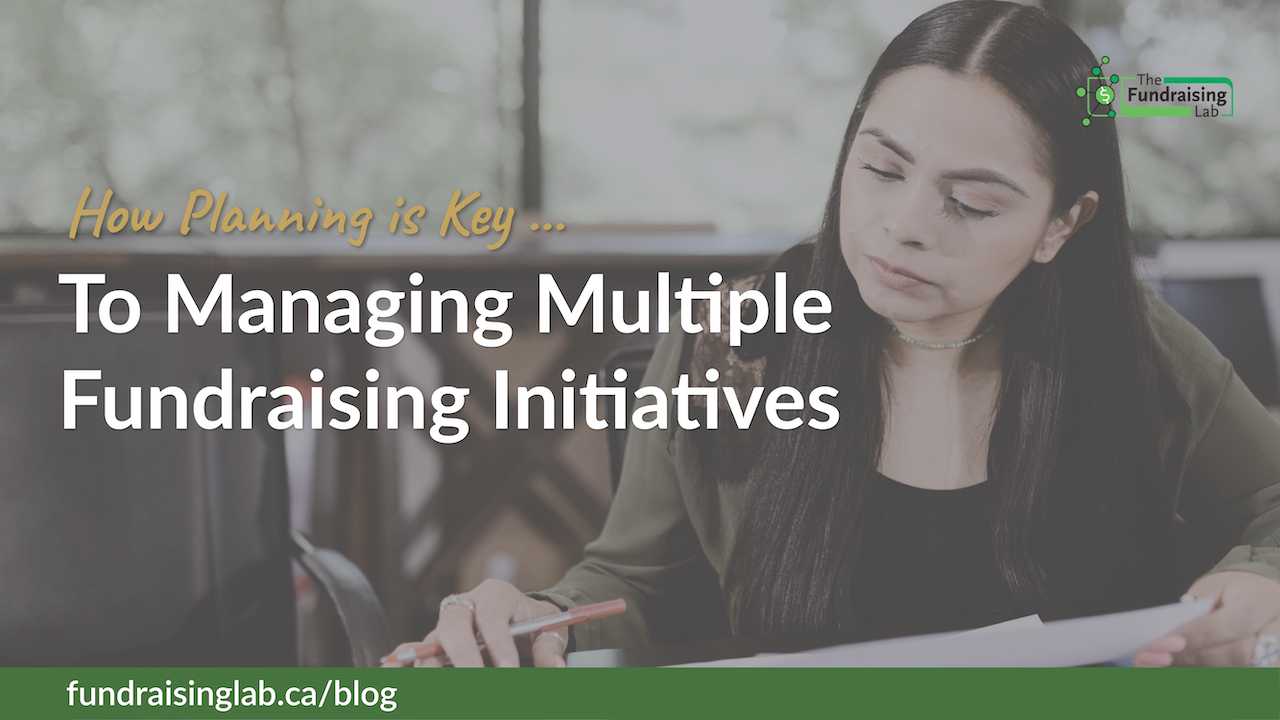How Planning is Key to Managing Multiple Fundraising Initiatives

Have you ever heard of the old Zen saying: If you don’t have time to meditate for 5 minutes, then meditate for an hour.

(ummmm….I can’t do that with my legs)
Now, I’m not sure if you’ve ever tried meditating but when you are a fundraiser, you are b.u.s.y. And there are only so many hours in a day.
And as a fundraiser, you have multiple projects that need to be worked on concurrently.
You have…
- A direct marketing (DM) campaign that needs to get out
- A couple of big foundation grants (due around the same time as the DM campaign)
- A board meeting to plan for
- Giving Tuesday around the corner
- And a special event that’s 9 months out, but you need to talk with prospective sponsors now to thank them for their past support and get a renewal confirmation…in fact, you should have done that a couple of months ago.
If you’re not planning for all of these kinds of things, you can see how easy it would be to skip something. It could be that you forget a grant deadline or keep postponing speaking to your sponsors.
And you can see (and already know) that fundraising is a multitude of different disciplines, all crammed under the heading “fundraising.”
When you break it down, it includes:
- Direct marketing which itself includes direct mail letters, and digital media – which require widely different skill sets
- Major gift fundraising – that’s a skill that requires lots of practice to get good at. And it can be intimidating for most people.
- Foundation grant writing is a special skill that requires research, and writing and interviewing, and listening and communications skills
- Corporate giving – is a whole discipline in and of itself
- Special events - where you have to juggle all kinds of different skills: logistics, on-the-fly problem solving, be able to deal with people really well
- And then throw in all of the infrastructure to support these strategies: budgeting and database management and policy development and communications and evaluation…
>>>and I could go on.
Fundraising as a profession is like the ultimate in multi-tasking.
And if you work in a small or mid-sized shop, you’re probably doing a little bit of all of the above. Or trying to.
But listen up: we all like to think we can multi-task.
The truth is that research has shown that we can’t actually perform two tasks that require high-level brain function at once. Your brain just can’t do it.
What you’re actually doing is switching between tasks very quickly.
And I think that is a great way to think about fundraising. If you’re running a fundraising program, you are constantly required to quickly switch between tasks.
And it’s exhausting.
And here’s what research also has shown us about multi-tasking: you end up being less effective when you switch back and forth vs. spending focused attention on one task.
So why all this talk about multi-tasking? Because it’s what we have to do if we are running a fundraising program with a diversity of strategies.
So what, you may be saying.
Well, here’s the thing. Because you’re running a fundraising program with a diversity of strategies….
It’s the whole reason for needing a fundraising plan – so that we CAN do multiple things and even be somewhat effective at them.
If you don’t have a plan, it’s easy to lurch from special event to direct marketing campaign to foundation grant without ever taking the time to understand…
- what's working
- what's not
- how much time each initiative is going to take and,
- how many people you need to involve for it to be successful.
Without taking the time to plan, it’s easy to never stop to think about the connective tissue between everything that you’re doing.
I see this so often…folks have a fundraising program that is a series of discrete activities.
There is no connection between each thing they are doing.
Don’t get me wrong: you may have fundraising initiatives that stand alone and are not connected to each other.
But think about how much more effective it will be if you can cross-promote your work. Imagine using special events as cultivation and stewardship opportunities? Invite some of your special friends – donors or other folks – to your events as a thanks for all they do.
I used to have an event that was a $25 ticket price. And it was a pretty cool event. I invited folks who were important to my fundraising program to the event for free. Only a handful ever took me up on the offer, so it didn’t cost me much. And it was so nice to be able to reach out to people with an offer of something rather than only asking for something when I contacted them.
Ok, so here’s why planning is so important to managing multiple fundraising initiatives:
- You take time to think about your fundraising program. This alone is worth the time to plan. It shifts how you do your work when you are intentional about things. This is true in life, too. Bringing intention to your life and work can make a big difference.
- You block off time to do things because you begin to pay attention to how much time things take you to do. When you don’t know what you don’t know, it’s easy to underestimate how long things will take. When you are being intentional about planning, you begin to be more mindful of how much time things take. And if you got it wrong the first time around, you can learn from your first effort and factor in more time the next time around.
- You pay attention to sequencing to make sure you’re not swamped at a particular time of the year, so that you won’t add in new stuff at your busiest time of year.
- You can review your plan and course correct if you’re not hitting milestones or metrics. I can tell you that lots of folks who have used my planning approach commented on how helpful it was to have a plan when COVID hit.
- You can take time to think about who else needs to be involved in everything you do and include them in your plan. You cannot fundraise alone.
- Here’s a biggie: a plan will help you work on what is important and not what you’re most comfortable doing. It’s human nature to default to our comfort zone – especially when you have multiple fundraising initiatives to manage at once.
A plan will keep you from simply doing what you like the most and keep you on track to do what is most important. Because that is what can be so challenging about managing multiple things: it’s easy to get paralyzed by having to do so much so you freeze and do what is easiest for you.
If you still hear people say they don’t have time to plan…remember that old Zen saying...you should meditate for an hour.
Developing your fundraising plan is kind of the same.
If you think you’re too busy to plan, you probably would benefit from spending even more time planning.

